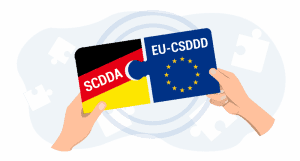
As a member of the European Union, Germany has played a significant role in shaping many of its economic and environmental directives. This influence has historically been substantial, but it has gained even more prominence following Britain’s exit from the EU and the Russian invasion of Ukraine. One particular area where Germany has exerted its influence is in the enactment of laws focusing on the ethical governance of businesses. A notable example is the Supply Chain Due Diligence Act (SCDDA), which is set to not only revolutionize business practices within Germany but also serve as a model for similar EU policies, such as the European Union’s Corporate Sustainability Due Diligence Directive (EU-CSDDD).
What is the SCDDA?
The SCDDA came into effect on 1st January 2023. Locally known as Lieferkettensorgfaltspflichtengesetz (LkSG), it is a comprehensive law designed to address Germany’s various supply chains while ensuring they uphold social and environmental standards. This legislation mandates that businesses implement several procedures to ensure that their operations, profits, and supply chains do not compromise the environment or the human rights of workers, children, or other stakeholders.
Lawmakers argued that while it’s crucial to maintain resilient supply chains, businesses have a significant responsibility to ensure they do so without exploiting workers or causing severe environmental impacts.
What is the EU-CSDDD?
The European Union is in the process of developing its own due diligence directive for businesses, known as the European Union’s Corporate Sustainability Due Diligence Directive (EU-CSDDD). While this directive is still under development, there is ongoing debate about how it will be enforced among member nations. Its primary objective is likely to mandate that companies maintain their supply chains without violating human rights or causing severe environmental harm.
The EU-CSDDD was initially proposed in February 2022 and, once adopted, will have a significant impact on how member nations conduct business and operate within the European Union. It is expected to play a pivotal role in promoting ethical and sustainable practices within the EU.
How will the two laws work together?
Clearly, the EU has taken a leaf out of the German playbook by creating the EU-CSDDD. However, while the German version of this due diligence law has some strict rules that all companies will follow, the EU version could appear to be more of a guide rather than something that will be strictly enforced.
Given Germany’s standing within the EU, the EU-CSDDD will likely bring how the rest of its member nations do business in line with Germany. This is important, not just in terms of social justice, but to satisfy one of the EU’s most important partner nations.
By enacting dual initiatives, both the EU and Germany are aiming to galvanize their supply chains, but not at the expense of the environment or other global partners. By making companies liable for their conduct in due diligence in supply chains, the EU and Germany will improve their international standing and, ideally, broaden and strengthen global ties.
Summary
By ensuring that their member nations follow the example of Germany, the EU will likely go to great lengths to synergize how it enforces due diligence on human rights and environmental protection in value chains on the companies that operate within its borders. While supply chain resilience and sustainability will be vital in the future, especially in the case of another global catastrophe like a pandemic, the EU (influenced by Germany’s SCDDA) won’t have to do so at the expense of the environment or people’s inalienable rights.
